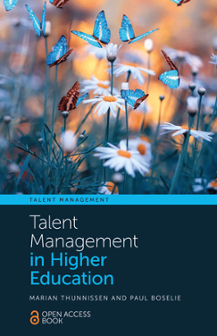
Index
Talent Management in Higher Education
ISBN: 978-1-80262-688-9, eISBN: 978-1-80262-685-8
Publication date: 21 May 2024
Citation
(2024), "Index", Thunnissen, M. and Boselie, P. (Ed.) Talent Management in Higher Education (Talent Management), Emerald Publishing Limited, Leeds, pp. 197-201. https://doi.org/10.1108/978-1-80262-685-820241012
Publisher
:Emerald Publishing Limited
Copyright © 2024 Marian Thunnissen and Paul Boselie
License
Published by Emerald Publishing Limited. These works are published under the Creative Commons Attribution (CC BY 4.0) licence. Anyone may reproduce, distribute, translate and create derivative works of these works (for both commercial and non-commercial purposes), subject to full attribution to the original publication and authors. The full terms of this licence may be seen at http://creativecommons.org/licences/by/4.0/legalcode.
INDEX
- Prelims
- Chapter 1: Introduction
- Chapter 2: The Changing Context of Higher Education and Its Impact on Academic Jobs and Academic Work
- Chapter 3: Wind of Change: The Recognition and Rewards Movement
- Chapter 4: Recognition and Rewards in Academia – Recent Trends in Assessment
- Chapter 5: Talent Management of Doctoral Students: Focus on Well-being, or How to Deal with the Mental Health Crisis in Graduate Education
- Chapter 6: Reimagining Doctorate Holders’ Motivations to Make Career Transitions: Exploring Post-PhD Career Prospects Within and Outside Academia
- Chapter 7: Talent Development in the Context of Higher Education
- Chapter 8: The Worth of a Talent? Pay Inequality in Universities
- Chapter 9: Collaborative Innovation in Academia: In Search for Coalitions and Strategic Alliances for HRM Transformation
- Chapter 10: Conclusion, Discussion and Recommendations
- Index